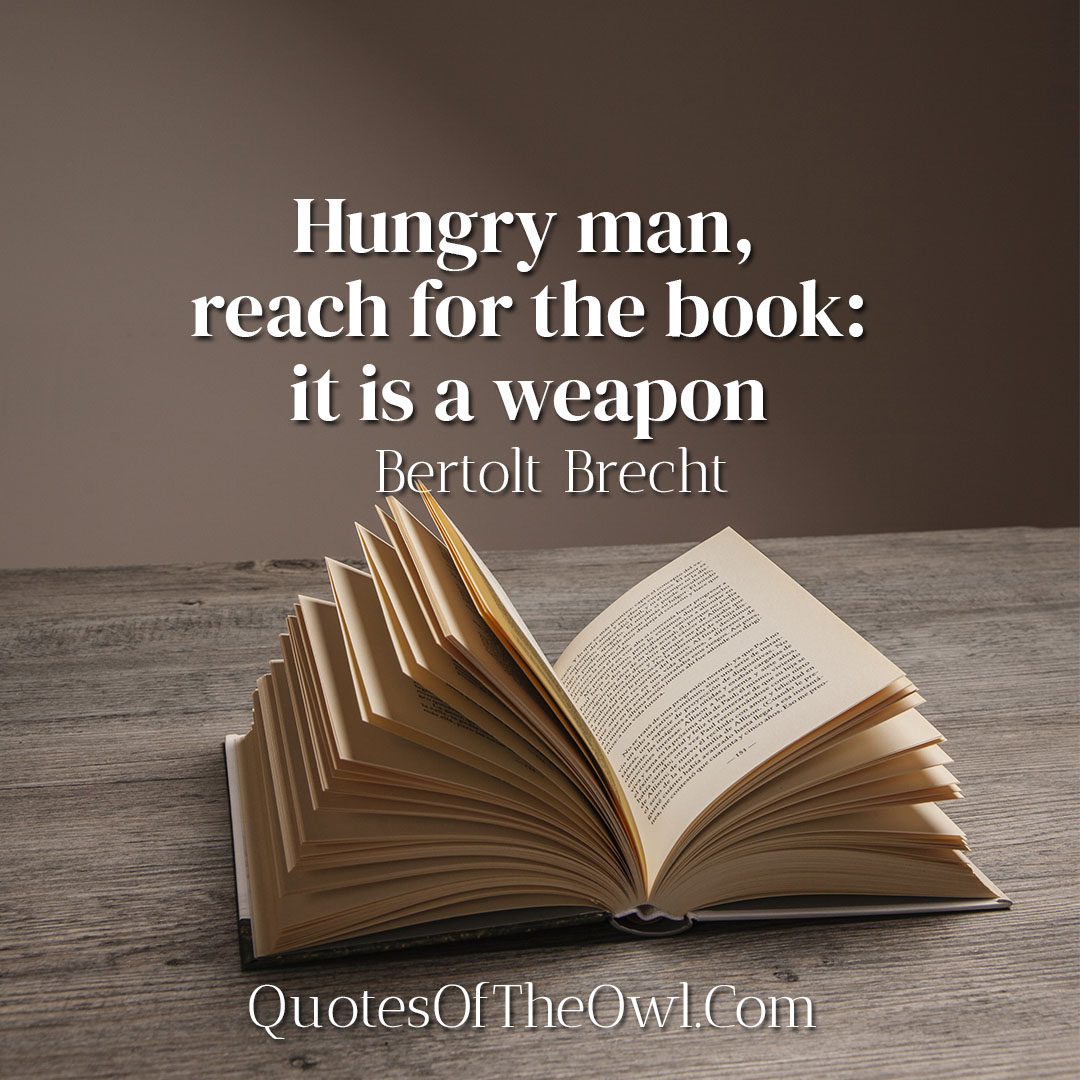Hungry man, reach for the book: it is a weapon – Bertolt Brecht’s Quote Meaning
Knowledge has always been regarded as a powerful tool that can shape individuals and societies. German playwright and poet Bertolt Brecht once proclaimed, “Hungry man, reach for the book: it is a weapon.” This profound statement captures the transformative potential of knowledge and highlights its significance in our lives. In this article, we will explore the meaning behind Brecht’s quote and delve into the idea of knowledge as a weapon.
Understanding the quote
At first glance, Brecht’s quote may seem perplexing. However, when we delve deeper, its meaning becomes clear. On a literal level, it suggests that in times of hunger or adversity, turning to books can provide sustenance and nourishment for the mind. Just as food nourishes the body, knowledge obtained from books can satiate intellectual hunger and stimulate personal growth.
Metaphorically, the quote goes beyond the literal interpretation. It implies that knowledge is a weapon that individuals can wield to challenge existing power structures, inspire change, and ignite revolutions. It suggests that by acquiring knowledge, individuals can empower themselves and others, enabling them to fight against oppression, ignorance, and injustice.
Knowledge as a powerful tool
Books have been regarded as powerful tools throughout history. They contain a wealth of information, ideas, and experiences that can expand our understanding of the world. By reading books, we gain access to the collective wisdom of humanity, allowing us to learn from the successes and failures of those who came before us.
Knowledge plays a pivotal role in personal growth and development. It broadens our horizons, encourages critical thinking, and fosters creativity. Through learning, we can challenge our preconceived notions, question the status quo, and develop a more nuanced perspective of the world. In this way, knowledge becomes a catalyst for personal transformation and empowerment.
Hunger for knowledge
Cultivating a hunger for knowledge is essential for intellectual and personal growth. Just as hunger drives us to seek sustenance, the desire for knowledge propels us to explore new ideas and engage with different perspectives. It is this hunger that fuels our curiosity and motivates us to embark on intellectual journeys.
A hunger for knowledge leads to a lifelong commitment to learning. It encourages individuals to seek out new information, acquire new skills, and continuously expand their intellectual horizons. By embracing this hunger, we become lifelong learners, constantly striving to broaden our understanding of the world and our place in it.
Knowledge as a weapon
When Brecht speaks of knowledge as a weapon, he alludes to its potential to effect change. Throughout history, knowledge has been instrumental in challenging oppressive systems and inspiring revolutions.
By wielding knowledge as a weapon, individuals can challenge the status quo, expose injustices, and advocate for a more equitable society. The knowledge gained from books allows individuals to articulate their ideas, rally support, and dismantle oppressive structures. It empowers them to fight for justice, equality, and human rights.
Social and political implications
Brecht’s quote also carries significant social and political implications. Brecht himself was a proponent of “epic theater,” which sought to use art as a means of social and political critique. His works aimed to expose societal contradictions and motivate audiences to reflect on the world around them.
In this context, the quote encourages individuals to actively engage with the world, challenge societal norms, and strive for a more just and equitable society. It calls for art and literature to serve as vehicles for social change, provoking critical thinking and fostering a collective sense of responsibility.
The role of literature
Literature, in particular, has played a pivotal role in challenging existing power structures and inspiring change. Books have the ability to transport readers to different worlds, expose them to diverse perspectives, and evoke empathy. Through literature, we can explore the complexities of human experience and gain insights into the social, political, and cultural dynamics of our society.
Books have the power to challenge our assumptions, disrupt our biases, and encourage us to question established norms. They can be transformative agents, igniting conversations, and fostering empathy and understanding. Literature has the potential to disrupt the status quo, amplify marginalized voices, and inspire collective action.
Access to knowledge
While knowledge is indeed a weapon, its impact depends on access. Unfortunately, not everyone has equal access to education and books. Socioeconomic disparities, geographic location, and systemic barriers often limit individuals’ ability to acquire knowledge. This inequality of access reinforces existing power structures and perpetuates social and economic inequality.
To truly unleash the potential of knowledge as a weapon, it is crucial to address these disparities and promote equal access to education and books. Efforts such as community libraries, literacy programs, and digital initiatives can help bridge the gap. Furthermore, they ensure that knowledge becomes a weapon wielded by all, regardless of their background or circumstances.
Conclusion
Brecht’s quote, “Hungry man, reach for the book: it is a weapon,” encapsulates the transformative power of knowledge. Books and the knowledge they contain have the ability to nourish our minds, challenge established norms, and inspire social and political change. By cultivating a hunger for knowledge and promoting equal access to education and books, we can empower individuals to wield knowledge as a weapon for personal growth and societal transformation.
Discover the profound wisdom of Bertolt Brecht through his powerful quotes

